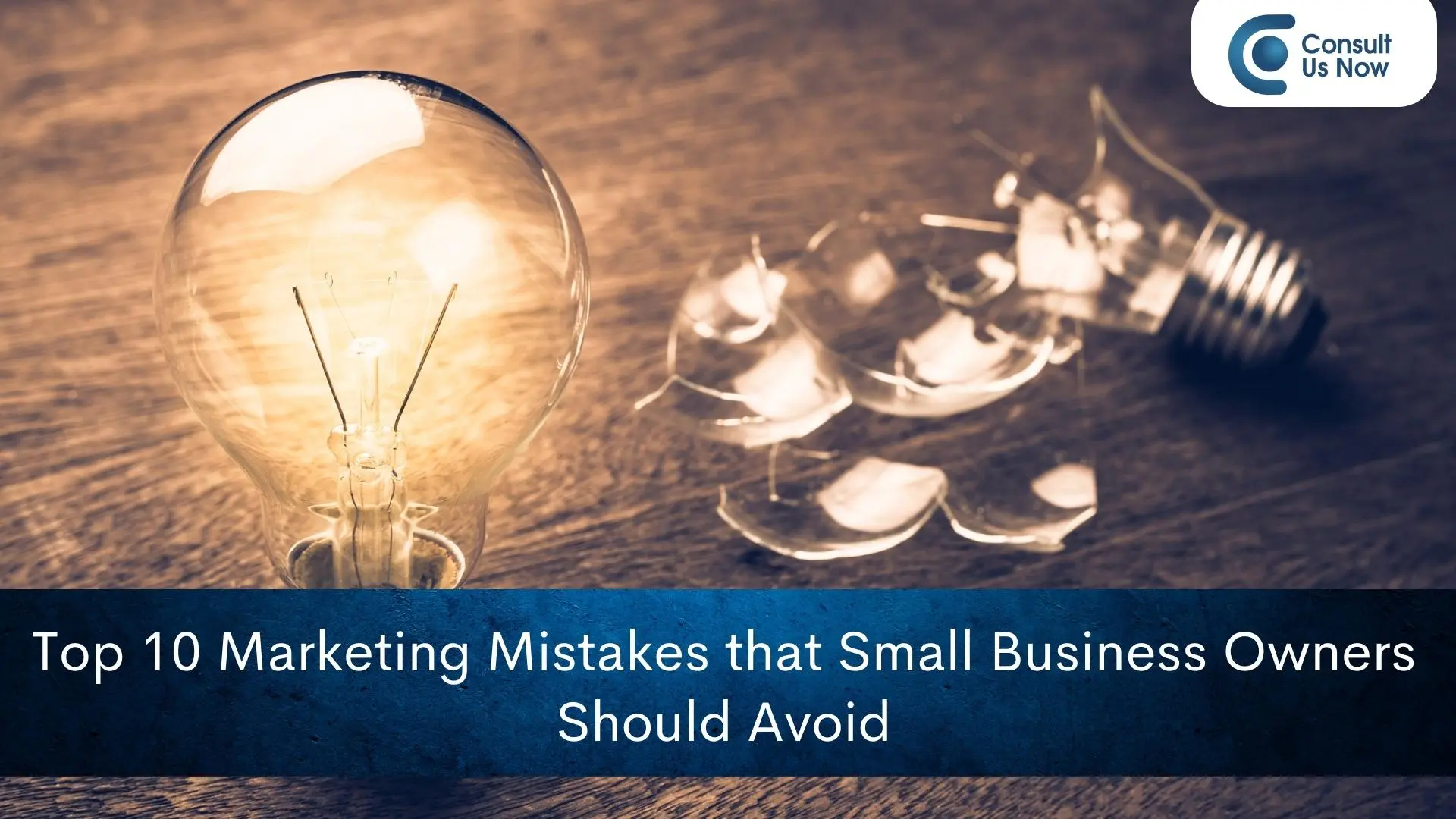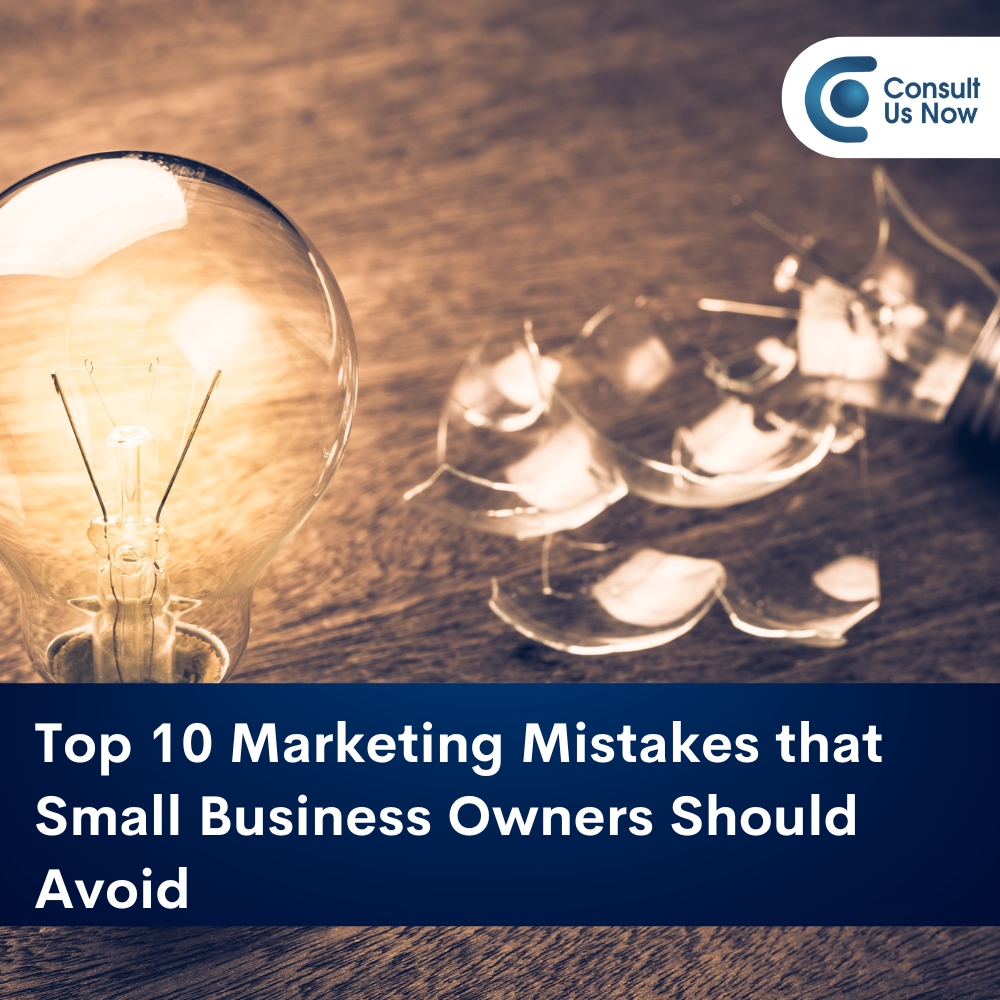
Top 10 Marketing Mistakes that Small Business Owners Should Avoid
Blog / Top 10 Marketing Mistakes that Small Business Owners Should Avoid
Table of Content
Introduction
Marketing plays a crucial role in the success of any small business. However, small business owners often face challenges when it comes to effectively marketing their products or services. By recognizing and avoiding common marketing mistakes, entrepreneurs can enhance their chances of reaching their target audience, building strong customer relationships, and driving business growth. In this blog post, we will explore 10 common marketing mistakes that small business owners should steer clear of, providing additional details and examples to illustrate each point.
Not Having a Clear Target Audience:
Without a clear understanding of your target audience, your marketing efforts may lack focus and fail to resonate with potential customers. For instance, a small business offering premium skincare products may identify their target audience as health-conscious women aged 25-45 who are interested in natural and organic beauty products. By defining their target audience’s demographics, interests, and needs, they can tailor their marketing messages effectively to address specific pain points and preferences. Reach out to the best digital marketing agency in Chennai to have a clear idea about your target audience.
Not Ignoring the Competition:
Understanding your competitors is essential for positioning your business and differentiating yourself in the market. Research your competition, analyze their strategies, and identify unique selling points that set your business apart. For example, a small restaurant may conduct competitor analysis and discover that no other local establishments offer a specific cuisine or focus on sustainable sourcing. They can leverage this information to position themselves as a unique dining experience and highlight their eco-friendly practices in their marketing efforts.
Not Measuring Success:
Failing to track and measure the success of your marketing campaigns prevents you from making informed decisions. Set clear goals, use metrics to evaluate your efforts, and adjust your strategies based on the data you collect. For instance, a small e-commerce business can track metrics such as website traffic, conversion rates, and customer feedback to gauge the effectiveness of their marketing campaigns. By measuring these key performance indicators, they can identify areas for improvement, optimize their strategies, and allocate resources effectively.
Neglecting Social Media:
Social media platforms offer invaluable opportunities for connecting with customers, building brand awareness, and driving engagement. Identify the platforms where your target audience is most active and create a consistent social media presence. For example, a small fashion boutique targeting young adults may find that platforms like Instagram and TikTok are popular among their target audience. By actively posting engaging content, responding to comments, and running targeted ad campaigns on these platforms, they can increase brand visibility and foster a loyal community of followers.
Not Having a Consistent Brand Message:
Consistency is key when it comes to branding. Establish a clear and compelling brand message that resonates with your target audience across all marketing channels. This consistency helps customers recognize and remember your business. For instance, a small graphic design agency that positions itself as innovative and creative should ensure that their website, social media profiles, and marketing materials all reflect this message consistently through design elements, tone of voice, and visual identity.
Failing To Invest In Quality Content:
Content marketing is an effective way to attract and retain customers. Create high-quality and relevant content that addresses your audience’s pain points, educates them, and builds trust in your expertise. For example, a small accounting firm may create blog posts, videos, or webinars that provide valuable insights on tax planning or financial management for small businesses. By consistently delivering quality content, they can establish themselves as a trusted resource and attract potential clients.
Not Using Data To Inform Marketing Decisions:
Data-driven insights enable you to make informed marketing decisions. Leverage analytics tools to gain valuable information about customer behavior, preferences, and trends. Use this data to refine your strategies and maximize your marketing efforts’ impact. For example, an online retailer can analyze customer purchase history, browsing patterns, and demographics to personalize product recommendations and tailor their email marketing campaigns effectively, resulting in higher conversion rates and customer satisfaction.
Not Having a Mobile-friendly Website:
With the increasing number of users accessing the internet through mobile devices, having a mobile-friendly website is crucial. Optimize your website for mobile viewing, ensuring it is responsive, loads quickly, and provides a seamless user experience. For instance, a small travel agency can invest in responsive design and mobile optimization to ensure that potential customers can easily browse and book travel packages from their smartphones or tablets, enhancing user experience and conversion rates.
Overlooking Email Marketing:
Email marketing remains a cost-effective and powerful tool for reaching your target audience directly. Build an email list, segment it based on customer preferences, and deliver personalized and valuable content to nurture relationships with your subscribers. For example, a small online fitness coach can send regular newsletters to their subscribers, sharing workout tips, healthy recipes, and exclusive offers. By providing value through email marketing, they can strengthen customer loyalty and drive repeat business.
Not Adapting to Changing Market Conditions:
The marketing landscape is ever-evolving, and businesses must adapt to stay relevant. Stay updated on industry trends, consumer behavior shifts, and emerging technologies. Flexibility and agility are key to thriving in a dynamic market. For example, a small technology startup must continuously monitor the market and adapt their marketing strategies to capitalize on emerging trends, such as incorporating artificial intelligence into their products or utilizing influencer marketing to reach a younger audience.
Conclusion:
Small business owners face various marketing challenges, but by avoiding these ten common mistakes, they can increase their chances of marketing success. By understanding their target audience, embracing social media, measuring their efforts, and adapting to changing market conditions, entrepreneurs can create effective marketing campaigns that drive growth, build strong customer relationships, and ultimately lead to business success. Remember, marketing is an ongoing process, and continuous improvement and adaptation are key to staying ahead in today’s competitive business landscape. We at Consult Us Now are ready to join hands with you to promote your business.

